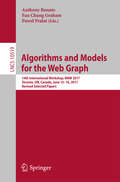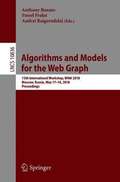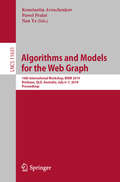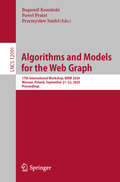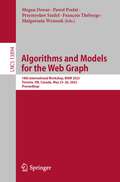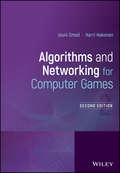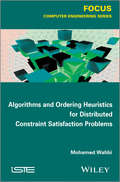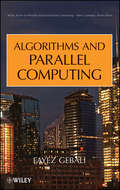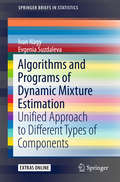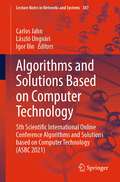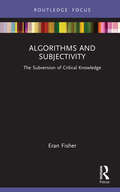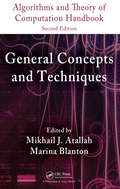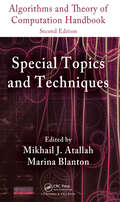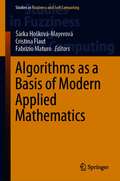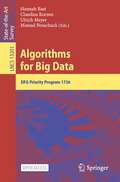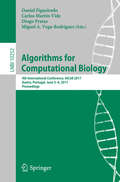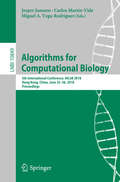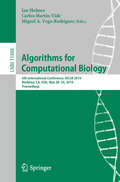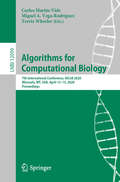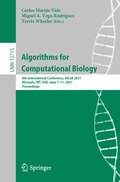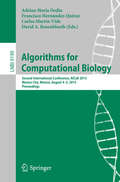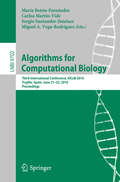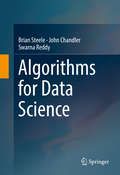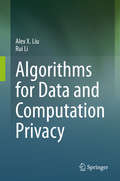- Table View
- List View
Algorithms and Models for the Web Graph: 14th International Workshop, WAW 2017, Toronto, ON, Canada, June 15–16, 2017, Revised Selected Papers (Lecture Notes in Computer Science #10519)
by Anthony Bonato Fan Chung Graham Paweł PrałatThis book constitutes the refereed proceedings of the 9th International Workshop on Algorithms and Models for the Web-Graph, WAW 2012, held in Halifax, Nova Scotia, Canada, in June 2012. The 13 papers presented were carefully reviewed and selected for inclusion in this volume. They address a number of topics related to the complex networks such hypergraph coloring games and voter models; algorithms for detecting nodes with large degrees; random Appolonian networks; and a sublinear algorithm for Pagerank computations.
Algorithms and Models for the Web Graph: 15th International Workshop, WAW 2018, Moscow, Russia, May 17-18, 2018, Proceedings (Theoretical Computer Science and General Issues #10836)
by Anthony Bonato Paweł Prałat Andrei RaigorodskiiThis book constitutes the proceedings of the 15th International Workshop on Algorithms and Models for the Web Graph, WAW 2018, held in Moscow, Russia in May 2018.<P><P> The 11 full papers presented in this volume were carefully reviewed and selected from various submissions. The papers focus on topics like the information retrieval and data mining on the Web; Web as a text repository and as a graph, induced in various ways by link among pages, hosts and users; the understanding of graphs that arise from the Web and various user activities on the Web; stimulation of the development of high-performance algorithms and applications that exploit these graphs.
Algorithms and Models for the Web Graph: 16th International Workshop, WAW 2019, Brisbane, QLD, Australia, July 6–7, 2019, Proceedings (Lecture Notes in Computer Science #11631)
by Paweł Prałat Konstantin Avrachenkov Nan YeThis book constitutes the proceedings of the 16th International Workshop on Algorithms and Models for the Web Graph, WAW 2019, held in Brisbane, QLD, Australia, in July 2019. The 9 full papers presented in this volume were carefully reviewed and selected from 13 submissions. The papers cover topics of all aspects of algorithmic and mathematical research in the areas pertaining to the World Wide Web, espousing the view of complex data as networks.
Algorithms and Models for the Web Graph: 17th International Workshop, WAW 2020, Warsaw, Poland, September 21–22, 2020, Proceedings (Lecture Notes in Computer Science #12091)
by Bogumił Kamiński Paweł Prałat Przemysław SzufelThis book constitutes the proceedings of the 17th International Workshop on Algorithms and Models for the Web Graph, WAW 2020, held in Warsaw, Poland, in September 2020. The 12 full papers presented in this volume were carefully reviewed and selected from 19 submissions. The aim of the workshop was to further the understanding of graphs that arise from the Web and various user activities on the Web, and stimulate the development of high-performance algorithms and applications that exploit these graphs.Due to the corona pandemic the conference was postponed from June 2020 to September 2020.
Algorithms and Models for the Web Graph: 18th International Workshop, WAW 2023, Toronto, ON, Canada, May 23–26, 2023, Proceedings (Lecture Notes in Computer Science #13894)
by Megan Dewar Paweł Prałat Przemysław Szufel François Théberge Małgorzata WrzosekThis book constitutes the proceedings of the 18th International Workshop on Algorithms and Models for the Web Graph, WAW 2023, held in Toronto, Canada, in May 23–26, 2023.The 12 Papers presented in this volume were carefully reviewed and selected from 21 submissions. The aim of the workshop was understanding of graphs that arise from the Web and various user activities on the Web, and stimulate the development of high-performance algorithms and applications that exploit these graphs.
Algorithms and Networking for Computer Games
by Harri Hakonen Jouni SmedThe essential guide to solving algorithmic and networking problems in commercial computer games, revised and extended Algorithms and Networking for Computer Games, Second Edition is written from the perspective of the computer scientist. Combining algorithmic knowledge and game-related problems, it explores the most common problems encountered in game programing. The first part of the book presents practical algorithms for solving “classical” topics, such as random numbers, procedural generation, tournaments, group formations and game trees. The authors also focus on how to find a path in, create the terrain of, and make decisions in the game world. The second part introduces networking related problems in computer games, focusing on four key questions: how to hide the inherent communication delay, how to best exploit limited network resources, how to cope with cheating and how to measure the on-line game data. Thoroughly revised, updated, and expanded to reflect the many constituent changes occurring in the commercial gaming industry since the original, this Second Edition, like the first, is a timely, comprehensive resource offering deeper algorithmic insight and more extensive coverage of game-specific networking problems than ordinarily encountered in game development books. Algorithms and Networking for Computer Games, Second Edition: Provides algorithmic solutions in pseudo-code format, which emphasises the idea behind the solution, and can easily be written into a programming language of choice Features a section on the Synthetic player, covering decision-making, influence maps, finite-state machines, flocking, fuzzy sets, and probabilistic reasoning and noise generation Contains in-depth treatment of network communication, including dead-reckoning, local perception filters, cheating prevention and on-line metrics Now includes 73 ready-to-use algorithms and 247 illustrative exercises Algorithms and Networking for Computer Games, Second Edition is a must-have resource for advanced undergraduate and graduate students taking computer game related courses, postgraduate researchers in game-related topics, and developers interested in deepening their knowledge of the theoretical underpinnings of computer games and in learning new approaches to game design and programming.
Algorithms and Ordering Heuristics for Distributed Constraint Satisfaction Problems
by Mohamed WahbiDisCSP (Distributed Constraint Satisfaction Problem) is a general framework for solving distributed problems arising in Distributed Artificial Intelligence. A wide variety of problems in artificial intelligence are solved using the constraint satisfaction problem paradigm. However, there are several applications in multi-agent coordination that are of a distributed nature. In this type of application, the knowledge about the problem, that is, variables and constraints, may be logically or geographically distributed among physical distributed agents. This distribution is mainly due to privacy and/or security requirements. Therefore, a distributed model allowing a decentralized solving process is more adequate to model and solve such kinds of problem. The distributed constraint satisfaction problem has such properties. Contents Introduction Part 1. Background on Centralized and Distributed Constraint Reasoning 1. Constraint Satisfaction Problems 2. Distributed Constraint Satisfaction Problems Part 2. Synchronous Search Algorithms for DisCSPs 3. Nogood Based Asynchronous Forward Checking (AFC-ng) 4. Asynchronous Forward Checking Tree (AFC-tree) 5. Maintaining Arc Consistency Asynchronously in Synchronous Distributed Search Part 3. Asynchronous Search Algorithms and Ordering Heuristics for DisCSPs 6. Corrigendum to “Min-domain Retroactive Ordering for Asynchronous Backtracking” 7. Agile Asynchronous BackTracking (Agile-ABT) Part 4. DisChoco 2.0: A Platform for Distributed Constraint Reasoning 8. DisChoco 2.0 9. Conclusion About the Authors Mohamed Wahbi is currently an associate lecturer at Ecole des Mines de Nantes in France. He received his PhD degree in Computer Science from University Montpellier 2, France and Mohammed V University-Agdal, Morocco in 2012 and his research focused on Distributed Constraint Reasoning.
Algorithms and Parallel Computing
by Fayez GebaliThere is a software gap between the hardware potential and the performance that can be attained using today's software parallel program development tools. The tools need manual intervention by the programmer to parallelize the code. Programming a parallel computer requires closely studying the target algorithm or application, more so than in the traditional sequential programming we have all learned. The programmer must be aware of the communication and data dependencies of the algorithm or application. This book provides the techniques to explore the possible ways to program a parallel computer for a given application.
Algorithms and Programs of Dynamic Mixture Estimation: Unified Approach to Different Types of Components (SpringerBriefs in Statistics)
by Ivan Nagy Evgenia SuzdalevaThis book provides a general theoretical background for constructing the recursive Bayesian estimation algorithms for mixture models. It collects the recursive algorithms for estimating dynamic mixtures of various distributions and brings them in the unified form, providing a scheme for constructing the estimation algorithm for a mixture of components modeled by distributions with reproducible statistics. It offers the recursive estimation of dynamic mixtures, which are free of iterative processes and close to analytical solutions as much as possible. In addition, these methods can be used online and simultaneously perform learning, which improves their efficiency during estimation. The book includes detailed program codes for solving the presented theoretical tasks. Codes are implemented in the open source platform for engineering computations. The program codes given serve to illustrate the theory and demonstrate the work of the included algorithms.
Algorithms and Solutions Based on Computer Technology: 5th Scientific International Online Conference Algorithms and Solutions based on Computer Technology (ASBC 2021) (Lecture Notes in Networks and Systems #387)
by Igor Ilin Carlos Jahn László UngváriThis book is a collection of papers compiled from the conference "Algorithms and Computer-Based Solutions" held on June 8-9, 2021 at Peter the Great St. Petersburg Polytechnic University (SPbPU), St. Petersburg, Russia. The authors of the book are leading scientists from Russia, Germany, Netherlands, Greece, Hungary, Kazakhstan, Portugal, and Poland.The reader finds in the book information from experts on the most interesting trends in digitalization - issues of development and implementation of algorithms, IT and digital solutions for various areas of economy and science, prospects for supercomputers and exo-intelligent platforms; applied computer technologies in digital production, healthcare and biomedical systems, digital medicine, logistics and management; digital technologies for visualization and prototyping of physical objects.The book helps the reader to increase his or her expertise in the field of computer technologies discussed.
Algorithms and Subjectivity: The Subversion of Critical Knowledge (Routledge Focus on Digital Media and Culture)
by Eran FisherIn this thought-provoking volume, Eran Fisher interrogates the relationship between algorithms as epistemic devices and modern notions of subjectivity. Over the past few decades, as the instrumentalization of algorithms has created knowledge that informs our decisions, preferences, tastes, and actions, and the very sense of who we are, they have also undercut, and arguably undermined, the Enlightenment-era ideal of the subject. Fisher finds that as algorithms enable a reality in which knowledge is created by circumventing the participation of the self, they also challenge contemporary notions of subjectivity. Through four case-studies, this book provides an empirical and theoretical investigation of this transformation, analyzing how algorithmic knowledge differs from the ideas of critical knowledge which emerged during modernity – Fisher argues that algorithms create a new type of knowledge, which in turn changes our fundamental sense of self and our concept of subjectivity. This book will make a timely contribution to the social study of algorithms and will prove especially valuable for scholars working at the intersections of media and communication studies, internet studies, information studies, the sociology of technology, the philosophy of technology, and science and technology studies.
Algorithms and Theory of Computation Handbook, Volume 1: General Concepts and Techniques (Chapman & Hall/CRC Applied Algorithms and Data Structures series)
by Mikhail J. Atallah Marina BlantonAlgorithms and Theory of Computation Handbook, Second Edition: General Concepts and Techniques provides an up-to-date compendium of fundamental computer science topics and techniques. It also illustrates how the topics and techniques come together to deliver efficient solutions to important practical problems. Along with updating and revising many
Algorithms and Theory of Computation Handbook, Volume 2: Special Topics and Techniques (Chapman & Hall/CRC Applied Algorithms and Data Structures series)
by Mikhail J. Atallah Marina BlantonAlgorithms and Theory of Computation Handbook, Second Edition: Special Topics and Techniques provides an up-to-date compendium of fundamental computer science topics and techniques. It also illustrates how the topics and techniques come together to deliver efficient solutions to important practical problems.Along with updating and revising many of
Algorithms as a Basis of Modern Applied Mathematics (Studies in Fuzziness and Soft Computing #404)
by Šárka Hošková-Mayerová Fabrizio Maturo Cristina FlautThis book offers a self-contained guide to advanced algorithms and their applications in various fields of science. Gathering contributions by authoritative researchers in the field of mathematics, statistics and computer science, it aims at offering a comprehensive and up-to-date view of algorithms, including the theory behind them, as well as practical considerations, current limitations and solutions. It covers applications in energy management, decision making, computer networks, materials science, mechanics and process optimization. It offers an integrated and timely guide to important algorithms, and represents a valuable reference resource for graduate students and researchers in various fields of applied mathematics, statistics and engineering.
Algorithms for Big Data: DFG Priority Program 1736 (Lecture Notes in Computer Science #13201)
by Ulrich Meyer Hannah Bast Claudius Korzen Manuel PenschuckThis open access book surveys the progress in addressing selected challenges related to the growth of big data in combination with increasingly complicated hardware. It emerged from a research program established by the German Research Foundation (DFG) as priority program SPP 1736 on Algorithmics for Big Data where researchers from theoretical computer science worked together with application experts in order to tackle problems in domains such as networking, genomics research, and information retrieval. Such domains are unthinkable without substantial hardware and software support, and these systems acquire, process, exchange, and store data at an exponential rate. The chapters of this volume summarize the results of projects realized within the program and survey-related work.This is an open access book.
Algorithms for Computational Biology: 4th International Conference, AlCoB 2017, Aveiro, Portugal, June 5-6, 2017, Proceedings (Lecture Notes in Computer Science #10252)
by Daniel Figueiredo, Carlos Martín-Vide, Diogo Pratas and Miguel A. Vega-RodríguezThis book constitutes the proceedings of the 4th InternationalConference on Algorithms for Computational Biology, AlCoB 2017, held in Aveiro, Portugal, in June 2017. The 10 full papers presented together with 2 invited papers were carefully reviewed and selected from 24 submissions. They are organized in the following topical sections: Graph Algorithms for Computational Biology; Phylogenetics; and Sequence Analysis and Other Biological Processes.
Algorithms for Computational Biology: 5th International Conference, AlCoB 2018, Hong Kong, China, June 25–26, 2018, Proceedings (Lecture Notes in Computer Science #10849)
by Carlos Martín-Vide Miguel A. Vega-Rodríguez Jesper JanssonThis book constitutes the proceedings of the 5th InternationalConference on Algorithms for Computational Biology, AlCoB 2018, held in Hong Kong, China, in June 2018. The 11 full papers presented together with 1 invited paper were carefully reviewed and selected from 20 submissions. They are organized in the following topical sections: Phylogenetics, Sequence Rearrangement and Analysis, Systems Biology and Other Biological Processes.
Algorithms for Computational Biology: 6th International Conference, AlCoB 2019, Berkeley, CA, USA, May 28–30, 2019, Proceedings (Lecture Notes in Computer Science #11488)
by Carlos Martín-Vide Miguel A. Vega-Rodríguez Ian HolmesThis book constitutes the proceedings of the 6th InternationalConference on Algorithms for Computational Biology, AlCoB 2019, held in Berkeley, CA, USA, in May 2019. The 15 full papers presented together with 1 invited paper were carefully reviewed and selected from 30 submissions. They are organized in the following topical sections: Biological networks and graph algorithms; genome rearrangement, assembly and classification; sequence analysis, phylogenetics and other biological processes.
Algorithms for Computational Biology: 7th International Conference, AlCoB 2020, Missoula, MT, USA, April 13–15, 2020, Proceedings (Lecture Notes in Computer Science #12099)
by Carlos Martín-Vide Miguel A. Vega-Rodríguez Travis WheelerThis book constitutes the proceedings of the 7th International Conference on Algorithms for Computational Biology, AlCoB 2020, was planned to be held in Missoula, MT, USA in April 2020. Due to the corona pandemic the conference was postponed to be held together with AlCoB 2021.The 15 full papers included in this volume were carefully reviewed and selected from 24 submissions. They were organized in topical sections on genomics, phylogenetics, and RNA-Seq and other biological processes.
Algorithms for Computational Biology: 8th International Conference, AlCoB 2021, Missoula, MT, USA, June 7–11, 2021, Proceedings (Lecture Notes in Computer Science #12715)
by Carlos Martín-Vide Miguel A. Vega-Rodríguez Travis WheelerThis book constitutes the proceedings of the 8th International Conference on Algorithms for Computational Biology, AlCoB 2020, was planned to be held in Missoula, MT, USA in June 2021. Due to the Covid-19 pandemic, AlCoB 2020 and AlCoB 2021 were merged and held on these dates together. AlCoB 2020 proceedings were published as LNBI 12099. The 12 full papers included in this volume were carefully reviewed and selected from 22 submissions. They were organized in topical sections on genomics, phylogenetics, and RNA-Seq and other biological processes. The scope of AlCoB includes topics of either theoretical or applied interest, namely: sequence analysis; sequence alignment; sequence assembly; genome rearrangement; regulatory motif finding; phylogeny reconstruction; phylogeny comparison; structure prediction; compressive genomics; proteomics: molecular pathways, interaction networks, mass spectrometry analysis; transcriptomics: splicing variants, isoform inference and quantification, differential analysis; next-generation sequencing: population genomics, metagenomics, metatranscriptomics, epigenomics; genome CD architecture; microbiome analysis; cancer computational biology; and systems biology.
Algorithms for Computational Biology: Second International Conference, AlCoB 2015, Mexico City, Mexico, August 4-5, 2015, Proceedings (Lecture Notes in Computer Science #9199)
by Carlos Martín-Vide Adrian-Horia Dediu Francisco Hernández-Quiroz David A. RosenbluethThis book constitutes the proceedings of the Second International Conference on Algorithms for Computational Biology, AICoB 2015, held in Mexico City, Mexico, in August 2015. The 11 papers presented in this volume were carefully reviewed and selected from 23 submissions. They were organized in topical sections named: genetic processing; molecular recognition/prediction; and phylogenetics.
Algorithms for Computational Biology: Third International Conference, AlCoB 2016, Trujillo, Spain, June 21-22, 2016, Proceedings (Lecture Notes in Computer Science #9702)
by María Botón-Fernández Carlos Martín-Vide Sergio Santander-Jiménez Miguel A. Vega-RodríguezThis book constitutes the proceedings of the Third InternationalConference on Algorithms for Computational Biology, AlCoB 2016, held inTrujillo, Spain, in June 2016.The 13 full papers presented in this volume were carefully reviewed andselected from 23 submissions. They are organized in the following topical sections: biological networks and modelling; biological structure processing; phylogenetics; and sequence analysis and rearrangement. In addition one invited talk is included.
Algorithms for Convex Optimization
by Nisheeth K. VishnoiIn the last few years, Algorithms for Convex Optimization have revolutionized algorithm design, both for discrete and continuous optimization problems. For problems like maximum flow, maximum matching, and submodular function minimization, the fastest algorithms involve essential methods such as gradient descent, mirror descent, interior point methods, and ellipsoid methods. The goal of this self-contained book is to enable researchers and professionals in computer science, data science, and machine learning to gain an in-depth understanding of these algorithms. The text emphasizes how to derive key algorithms for convex optimization from first principles and how to establish precise running time bounds. This modern text explains the success of these algorithms in problems of discrete optimization, as well as how these methods have significantly pushed the state of the art of convex optimization itself.
Algorithms for Data Science
by John Chandler Brian Steele Swarna ReddyThis textbook on practical data analytics unites fundamental principles, algorithms, and data. Algorithms are the keystone of data analytics and the focal point of this textbook. Clear and intuitive explanations of the mathematical and statistical foundations make the algorithms transparent. But practical data analytics requires more than just the foundations. Problems and data are enormously variable and only the most elementary of algorithms can be used without modification. Programming fluency and experience with real and challenging data is indispensable and so the reader is immersed in Python and R and real data analysis. By the end of the book, the reader will have gained the ability to adapt algorithms to new problems and carry out innovative analyses. This book has three parts: (a) Data Reduction: Begins with the concepts of data reduction, data maps, and information extraction. The second chapter introduces associative statistics, the mathematical foundation of scalable algorithms and distributed computing. Practical aspects of distributed computing is the subject of the Hadoop and MapReduce chapter. (b) Extracting Information from Data: Linear regression and data visualization are the principal topics of Part II. The authors dedicate a chapter to the critical domain of Healthcare Analytics for an extended example of practical data analytics. The algorithms and analytics will be of much interest to practitioners interested in utilizing the large and unwieldly data sets of the Centers for Disease Control and Prevention's Behavioral Risk Factor Surveillance System. (c) Predictive Analytics Two foundational and widely used algorithms, k-nearest neighbors and naive Bayes, are developed in detail. A chapter is dedicated to forecasting. The last chapter focuses on streaming data and uses publicly accessible data streams originating from the Twitter API and the NASDAQ stock market in the tutorials. This book is intended for a one- or two-semester course in data analytics for upper-division undergraduate and graduate students in mathematics, statistics, and computer science. The prerequisites are kept low, and students with one or two courses in probability or statistics, an exposure to vectors and matrices, and a programming course will have no difficulty. The core material of every chapter is accessible to all with these prerequisites. The chapters often expand at the close with innovations of interest to practitioners of data science. Each chapter includes exercises of varying levels of difficulty. The text is eminently suitable for self-study and an exceptional resource for practitioners.
Algorithms for Data and Computation Privacy
by Rui Li Alex X. LiuThis book introduces the state-of-the-art algorithms for data and computation privacy. It mainly focuses on searchable symmetric encryption algorithms and privacy preserving multi-party computation algorithms. This book also introduces algorithms for breaking privacy, and gives intuition on how to design algorithm to counter privacy attacks. Some well-designed differential privacy algorithms are also included in this book. Driven by lower cost, higher reliability, better performance, and faster deployment, data and computing services are increasingly outsourced to clouds. In this computing paradigm, one often has to store privacy sensitive data at parties, that cannot fully trust and perform privacy sensitive computation with parties that again cannot fully trust. For both scenarios, preserving data privacy and computation privacy is extremely important. After the Facebook–Cambridge Analytical data scandal and the implementation of the General Data Protection Regulation by European Union, users are becoming more privacy aware and more concerned with their privacy in this digital world. This book targets database engineers, cloud computing engineers and researchers working in this field. Advanced-level students studying computer science and electrical engineering will also find this book useful as a reference or secondary text.
